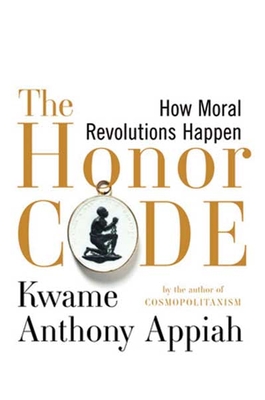
The Honour Code: How Moral Revolutions Happen by Kwame Anthony Appiah (WW Norton)
Two hundred years ago, if one English gentleman felt insulted by another, it was expected that they would meet at some lonely spot and try to kill one another. The duel was legally banned, but socially not just accepted but customary. Until a very few years earlier, trading in slaves – though it had always had its critics – was an entirely respectable occupation and generally seen as essential to Britain’s economic life. Almost a century after that, most people in China apparently thought it right and proper to cripple women from their infancy by deforming their feet with tight bindings: indeed among China’s upper classes it was almost unthinkable not to maintain a practice that was sanctioned by about a millennium of tradition, custom and belief.
Today, in many parts of the world, women who breach strict codes of sexual propriety or marital choice not only may but must be killed by their families. Murder in the name of family honour is most notoriously prevalent in Pakistan and parts of the Arab world, but is certainly not confined to these, nor only to Muslim societies.
Kwame Anthony Appiah asks how and why the first three customs – duelling, slave-trading and footbinding – were ended, and what those stories of social transformation might tell us about how to end “honour killings” today. Part of the answer lies in the spread of democracy, and the new power that a mobilised public opinion could wield in Britain in the early 19th century, and in China by the century’s end. Both the attack on duelling and that on footbinding were parts of a wider assault on aristocracy and its “traditions” in the societies concerned. Britain’s anti-slavery crusade involved massive mobilisation of protest among both middle and working classes (and also an unprecedented political upsurge amongst women, something Appiah could have made more of). It’s sometimes argued that the drive against the slave trade owed much to economics: that key economic power-holders changed their minds on the issue because slavery was ceasing to be profitable. One of the few quibbles one can make about Appiah’s deft use of historical evidence is that he’s too readily dismissive of that argument. And specifically religious arguments were central to both sides in all three historical battles, as they inescapably are now in that over murder in the family. It may be that Appiah, a resolutely secular thinker, underrates this too.
His own case is that the really crucial transformation, in all these cases, was in conceptions of honour. Practices once seen as entirely honourable – indeed, with duelling and footbinding, essential to the honour of the gentleman and the mandarin – ceased to be so. New, better, more encompassing notions of what it meant to behave honourably (and to have honour, which isn’t quite the same thing: Appiah explores the distinction skillfully) became available, then socially dominant. According to these the old practices were repugnant rather than laudable. The great changes came from below, not from top-down legislation or exhortation; they were true moral revolutions.
One can doubt, then, some aspects of Appiah’s historical reasoning – and this may entail slight scepticism too about his proposals to end honour killings. But one cannot doubt the power of his argument or the cleverness, and indeed charm, with which he makes it. This is in so many ways a brilliant book. It is also a model of historically and politically informed moral reasoning, of how a professional philosopher can bring his particular skills to bear on a question of universal concern – and do so in an impressively lucid and accessible style without ever condescending to the reader or sacrificing intellectual rigour. Appiah has long specialised in doing that, with fine books on racism, identity and cosmopolitanism. He has drawn throughout not only on his professional expertise but on his unusual “mixed” British-Ghanaian background and education. Exposure to two supposedly quite incommensurable systems of belief and social ethics imparts both a constant alertness to the pitfalls of transcultural communication and a strong basis for his insistence that one can translate between them, there are shared moral universals.
Appiah’s account of past moral revolutions inevitably invites one to speculate what other present practices apart from honour killing might, or should, be the subjects of future ones. My own top candidate would be death on the roads. Surely, in some not too distant future, people will be incredulous that still in 2010 every society on earth allowed a constant deathtoll from traffic accidents. Apparently decent, reasonable, morally upright people – really not so very different from us, our grandchildren will say – lamented this slaughter and sought to mitigate its worst excesses, but never took really decisive action against it. They thought it was unavoidable, the necessary price for freedom of movement. Almost as bizarrely, those same machines that did most of the killing were running on oil. Those morally incomprehensible people of 2010 couldn’t think of anything better to do with a vital, multi-purpose, fast dwindling natural resource than to keep on burning most of it! Hard to believe that this was how things were before the great moral revolution of 2020…

